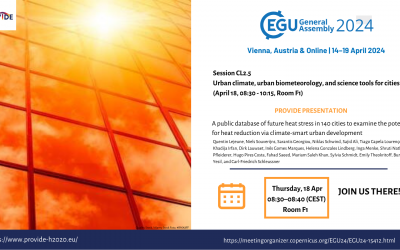The PROVIDE Climate Risk Dashboard
Overshooting the Paris Agreement temperature thresholds is a distinct possibility. Overshoot scenarios are defined by the IPCC Glossary as pathways that exceed the stabilization level (concentration, forcing, or temperature) before the end of a time horizon of interest (e.g., before 2100) and then decline towards that level by that time. Once the target level is exceeded, removal by sinks of greenhouse gases is required.
The PROVIDE Climate risk dashboard is an online platform providing detailed information on overshoot scenarios and expected impacts and their reversibility, with unique sectoral coverage including extreme events, biodiversity, cryosphere, carbon cycle, marine climate, economic damages, and socio-economic vulnerabilities, among others. The information includes global, national, and city-level modelling results. The dashboard offers innovative approaches to data presentation and a cutting-edge design co-developed in cooperation with stakeholders.
The dashboard includes an overshoot proofing module for adaptation planning which was co-developed together with a diverse group of stakeholders within the PROVIDE project.
Version 3 of the Dashboard was launched in December 2024 and the dashboard will be further developed beyond project end.

Get involved
Newsletter
Contact Us
About the Project
The 1.5°C Paris Agreement temperature goal provides the benchmark for global climate action to avoid the most devastating impacts of climate change. However, under current trajectories, overshooting (meaning the temporary exceedance of 1.5°C) the Paris temperature thresholds is a distinct possibility. The impacts of such overshoot scenarios would be particularly consequential for vulnerable regions and systems. Here, even in the case of only a temporary exceedance of 1.5°C, thresholds of abrupt and possibly irreversible shifts or adaptation limits may be exceeded. The PROVIDE project aims to deliver information on overshoot scenarios and respective impacts in the context of adaptation through an innovative web tool. You will be able to assess the risks of overshooting systemic thresholds (e.g. glacier melt) from the local to the global level. Moving beyond a limited set of climate scenarios, the PROVIDE approach allows you to make thresholds the starting point for the analysis and adaptation planning.
Latest News
Berlin TV Show Highlights PROVIDE Project Coordinator
Due to the great housing shortage in Berlin, densification between existing buildings is urgently needed. The previous residents often protest because they fear worse living conditions: less space, more heat. How this could be done in a climate-friendly way has now been investigated by PROVIDE partner Climate Analytics.
In conversation with: Carl-Friedrich Schleussner, Climate Analytics
PROVIDE EGU 2024 presentation 18 April
Join the EGU session on 18 April, 08:30–10:15 (CEST), Room F1: Urban climate, urban biometeorology, and science tools for cities. 08:30-08:40 PROVIDE presentation
“A public database of future heat stress in 140 cities to examine the potential for heat reduction via climate-smart urban development”
PROVIDE EGU 2024 session 15 April
Join the PROVIDE EGU session on 15 April, 16:15–18:00 (CEST), Room E2: Session CL3.2.1 “Towards a net-zero world and beyond”.



